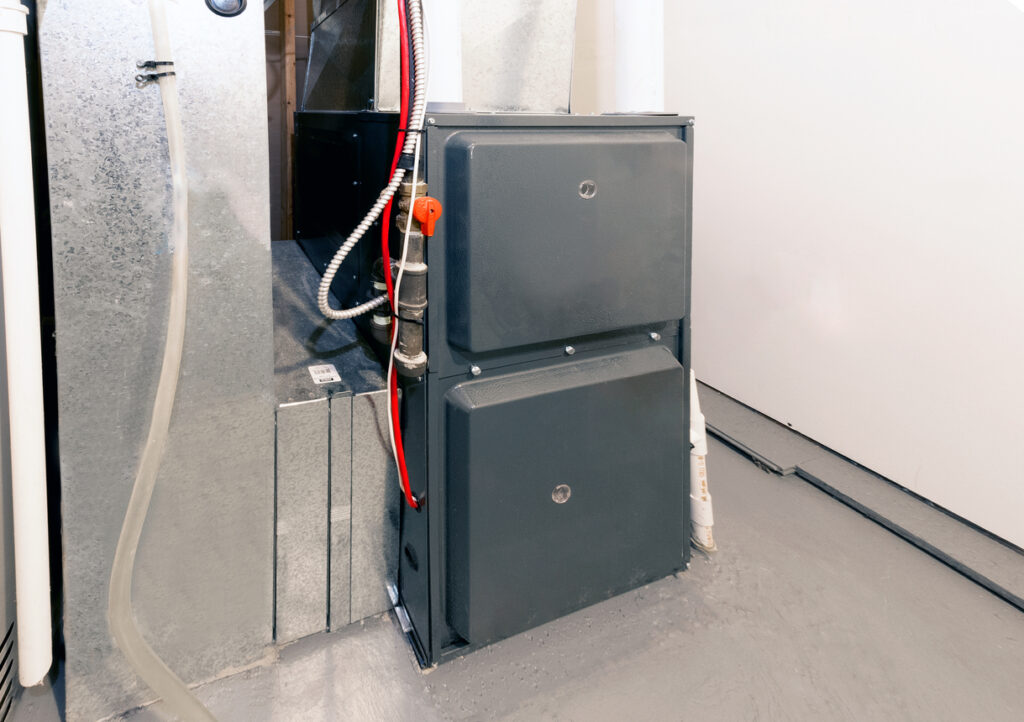When the Portland Bureau of Planning and Sustainability assessed the Home Energy Score program three years after its inception in 2018, it found that upgrading to a higher efficiency heating system or furnace was one of the top five ways to improve a home’s energy score. In this post we’ll break down the types of efficient furnaces and the factors that can help you determine which is best for your home.
Factors to Consider Before Buying a Furnace
There are many important factors to take into account when choosing an energy efficient furnace that may help to narrow down your decision. The first is climate: average temperatures where you live help to determine the type of furnace that is most compatible, from high-efficiency gas to a heat pump furnace. Second, the fuel source that is available in your area will help to determine which kind of furnace will be the most cost-efficient. Cost is another major consideration, taking into account both the upfront cost and the potential savings on heating bills over time. A furnace’s energy efficiency rating, whether a high Annual Fuel Utilization Efficiency (AFUE) rating of at least 90%, or the Heating Seasonal Performance Factor (HSPF) and Seasonal Energy Efficiency Ratio (SEER) for heat pump furnaces, is also an incredibly useful tool in determining which furnace is most efficient. Finally, look for a furnace that is Energy Star® certified, guaranteeing that it meets the criteria for high energy efficiency.
Features to Look For in a Furnace
First, consider the heating capacity of the furnace. When choosing a furnace, it is important to keep the size of your home in mind. A furnace that is too small will struggle to heat your home, while a furnace that is too large can lead to increased energy costs. Also look for furnaces with zoning capabilities, which allow you to independently adjust the temperatures of different rooms of your home. The energy-saving benefit of this feature is clear, due to the ability to heat only the areas of the home that are being used. A furnace with a variable-speed blower can adjust the airflow to match the heating needs of your home versus the constant output of a fixed-speed blower, saving money over time. Many people are aware of the benefits of installing a programmable thermostat with their furnace for the ability to set different temperatures for different times of the day, saving energy at night or when away from home.
High-Efficiency Gas Furnaces
High-efficiency gas furnaces have an Annual Fuel Utilization Efficiency (AFUE) rating of 90% or higher, meaning 90% of the fuel they burn is converted into heat. A high-efficiency gas furnace is one of the most cost-effective options in Portland largely because natural gas is a commonly used fuel in this area, but this may change as Portland is committed to distance itself from dependence on fossil fuels, and there are other high-efficiency furnace options that run on cleaner energy. An efficient gas furnace model should have zoning capabilities, a variable-speed blower, and a programmable thermostat to maximize its efficiency and performance.
Electric Furnaces
While electric furnaces are typically less efficient than gas furnaces, they don’t produce emissions like carbon monoxide, making them a more environmentally-friendly and potentially health-friendly choice if the home has ventilation issues. Additionally, they don’t lose heat through a flue or chimney like their gas furnace counterparts. Electric furnaces are generally less expensive to purchase and install than gas furnaces and require less maintenance over time. They also don’t require a gas line or a gas supply, for additional savings. They are easy to operate without the need for any other equipment or a pilot light that could go out. On the other hand, in areas where electricity rates are high, electric furnaces may be more expensive to operate than gas, and also may not be as effective in extremely cold temperatures. Finally, electric furnaces may also not be as suitable in larger homes that require significant heating power. The minimum efficiency requirement for an electric furnace to be Energy Star® certified AFUE rating of 95 or above, higher than the 90 AFUE rating required for gas furnaces.
Dual-Fuel Furnaces
A dual-fuel furnace, also known as a hybrid furnace, combines the benefits of an electric heat pump with a gas furnace. These furnaces are designed to switch between gas and electric heat, depending on which is more efficient at the moment. They are typically more expensive to install, but can save money on heating bills in the long run. Dual-fuel furnaces tend to be more energy-efficient than a gas furnace because of their ability to use electricity (which is generally less expensive than gas) to heat your home in mild temperatures, then switch to gas-powered heat when temperatures drop and a gas furnace becomes more efficient. Another benefit is fewer temperature fluctuations as the heat pump also provides cooling during the summer in addition to heating during mild winter weather, making them a good fit for Portland’s climate. One potential downside of dual-fuel furnaces to consider is that they are more complex as both a heat pump and a gas furnace and require more professional maintenance.
Heat pumps – (Currently the Most Popular Choice)
Heat pumps use the earth’s natural temperature to heat and cool your home. While they can be expensive to install, they are extremely energy-efficient and can save homeowners a significant amount of money on heating and cooling bills over time. Unlike a gas or electric furnace, a heat pump furnaces is a type of HVAC system that can both heat and cool a home. It works by extracting heat from outside air (even in cold temperatures) and transferring it indoors to heat the home. In the summer it does the reverse: pulling warm air from inside the home and releasing it outside, effectively lowering the temperature indoors. The efficiency of heat pump furnaces is measured by different criteria than other types of furnaces: the Heating Seasonal Performance Factor (HSPF) and Seasonal Energy Efficiency Ratio (SEER). To be certified by Energy Star, a heat pump furnace must meet the HSPF 8.2 or higher and SEER of 14 or higher. This year, heat pumps will be required to meet higher energy efficiency standards, raising the minimum SEER to 15 in the south and keeping it at 14 for the northern half of the country, and raising the HSPF to a minimum of 8.8. Heat pump furnaces are a good option for areas with mild climates because they work best when outside temperatures are above freezing. Since Portland’s winters are relatively mild, with average temperatures rarely dropping below freezing, a heat pump furnace is an excellent and environmentally-friendly choice for your Portland home.
Furnaces and Home Energy Scoring
Before reaching a final decision, it can also be helpful to consult with a licensed HVAC professional to determine the best type of furnace for your specific needs and ensure proper installation and maintenance. And if you are interested in learning even more ways you can lower your home’s energy use, a home energy score provides you with a customized list of the most effective improvements you can make to improve your home’s overall efficiency. Schedule an appointment today!

